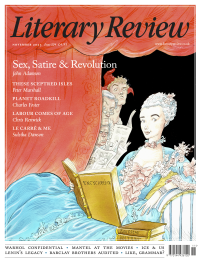Richard Overy
Britain’s Colony in Europe
Don’t Let’s Be Beastly to the Germans: The British Occupation of Germany, 1945–49
By Daniel Cowling
Head of Zeus 480pp £27.99
Few countries were as familiar with occupying other people’s territory as imperial Britain. The colonial pattern could be applied even to the conquered enemies of the Second World War. One suggestion from Britain’s Political Warfare Executive towards the end of the war was to extend dominion status within the Commonwealth to Germany, where the lessons of Westminster democracy could slowly be absorbed. Even the relentless bombing, which left the cities of occupied Germany in ruins, could be compared, so the RAF chief of staff told Churchill, to policing in the colonies, where air attacks were used to end insurgencies and teach the natives a lesson. Burning down their huts and driving off their cattle were in principle no different from incinerating half of Hamburg. The many officials and soldiers who descended on Germany after victory in May 1945 carried with them, consciously or not, an imperial mind-set.
In this excellent and absorbing account of the occupation of Germany, Daniel Cowling does not make much play with the imperial background, but he does convey the sense of entering an exotic land felt by many of those British occupiers who were brought up for years on a diet of propaganda painting the Germans as barbarous. The conquerors applied a rigid apartheid at first: there were privileges for the British and none for the indigenes; fraternisation was strictly forbidden; Germans were supposed to make way for the British on pavements. British-only clubs, cinemas and bars proliferated, and while the British often drank and ate to excess, the population they ruled endured hunger and deprivation. Cowling cites the journalist Ethel Mannin’s view of British life in occupation: ‘it could be South Africa … or India at the height of the British Raj.’
Of course, occupying Germany was not the same as ruling the empire. The Allied powers regarded Hitler’s Germany in 1945 with a mix of loathing, mistrust and contempt. Cowling provides rich details of the Germanophobia generated by the press, cinema and radio, not least through the reports of the

Sign Up to our newsletter
Receive free articles, highlights from the archive, news, details of prizes, and much more.@Lit_Review
Follow Literary Review on Twitter
Twitter Feed
The son of a notorious con man, John le Carré turned deception into an art form. Does his archive unmask the author or merely prove how well he learned to disappear?
John Phipps explores.
John Phipps - Approach & Seduction
John Phipps: Approach & Seduction - John le Carré: Tradecraft; Tradecraft: Writers on John le Carré by Federico Varese (ed)
literaryreview.co.uk
Few writers have been so eagerly mythologised as Katherine Mansfield. The short, brilliant life, the doomed love affairs, the sickly genius have together blurred the woman behind the work.
Sophie Oliver looks to Mansfield's stories for answers.
Sophie Oliver - Restless Soul
Sophie Oliver: Restless Soul - Katherine Mansfield: A Hidden Life by Gerri Kimber
literaryreview.co.uk
Literary Review is seeking an editorial intern.